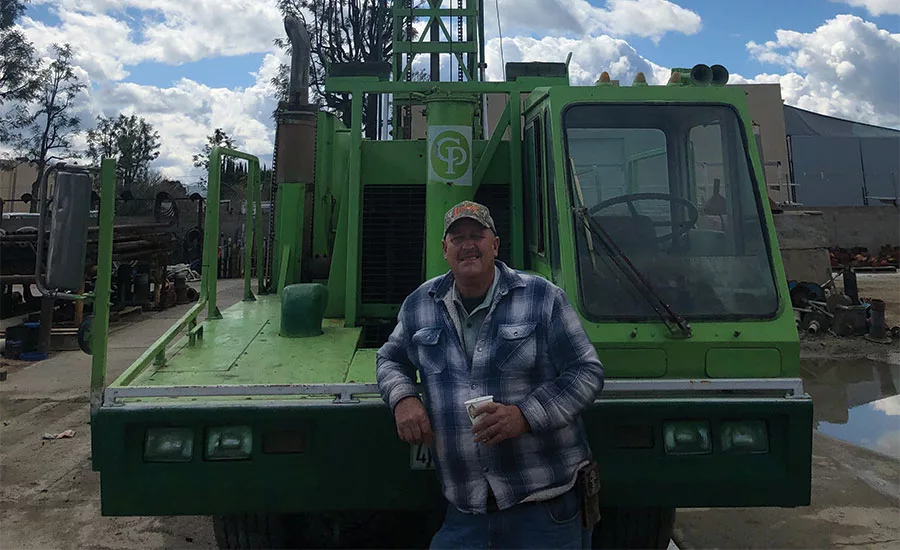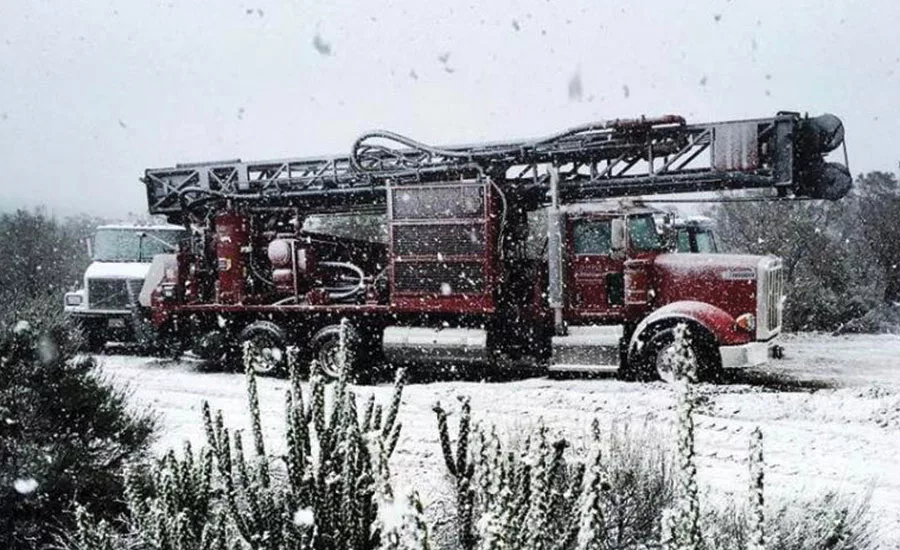You Know the Drill: Drilling Lessons from Dad

Ken Swarthout first started working for L.O. Lynch Quality Wells and Pumps Inc., in 1978, before buying the company in partnership with a coworker in 1994.
Source: L.O. Lynch Quality Wells and Pumps photos

Kenneth (Ken) S. Swarthout was born and raised in Hemet, California. His father was a farmer in the valley, and after serving in the Air Force, he and his brother turned to raising different types of crops. That’s where Swarthout learned the ins and outs of machinery. His father taught him how to run all of the different pieces of farming equipment he had in his fleet.
“With a caring father that did not let me cut corners on the job, I was taught to respect the iron, maintain the iron, so as to receive payment for the completed jobs that were done correctly,” he says.
When the farming dried up, it was a comfortable and natural transition to well drilling. He started working with the original owners of L.O. Lynch Quality Wells and Pumps in 1978, drilling residential and commercial wells.
“After the driller I was working with decided to move on, I stepped up to the plate to run the RT1800 drill that I had been a helper on for around 10 years,” Swarthout says.
In 1994, a death in the ownership of the company and a partnership with fellow employee Emil Worm allowed Swarthout the opportunity to buy out L.O. Lynch Wells, including one of the company’s 5T pulling units.
Together, they’ve developed the company into the full service water well drilling and pump installation company it is today with three drilling rigs, seven pulling units and support trucks for all their crews.
Q. What do you do, and what keeps you coming back every day?
A. Currently, I am sharing duties with my son, but I am still writing up estimates, meeting with customers to GPS County Permit Application plot plans, running parts to jobsites when needed, delivering county well permit applications, and checking on drill crews while going across three counties if needed.
Getting up every morning to welcome the new sunrise, bill paying, and talking to customers as well as employees seems to keep the relationship good with my wife of 20 years.
If there is one thing that still excites me, it’s when I hear from our drill crews how much water was hit and from what depth. It seems the wells are getting deeper. On our pump department jobs, I am so proud to see just how nicely they finish up.
Q. What does a typical workday involve?
A. A typical workday involves getting to the yard in the morning to talk with the drill and pump crews before they go out. Getting through the planned schedule from the day before and dealing with customer estimates keeps me busy. It is what pops up throughout the day that is unexpected and keeps my mind racing.
It seems that as I keep busy and take care of the issues presented before the end of the day, it makes the next day more profitable and meaningful.
Q. What does it take to succeed in what you do?
A. Just having good people/employees that you can trust and rely on is a big, big deal. Making sure you spend even just a little time with them, to hear about the good and bad in your own company, will help to ensure that you know what changes need to occur. And that takes a lot of listening.
A good economy, good customers, and strict attention to each drill site will ensure success for that site and a happy customer for future referrals.
Q. What do you wish you knew when you started?
A. I wish I knew the amount of time and energy that it takes to put into a business to not just survive, but to flourish. When a business fails, it is usually a cause of not enough attention and too much spending. California is just as tough as it sounds to do business in, with all of the anti-business politics and provisions that a business has to adhere to.
Having more schooling in business administration, but especially schooling in psychology for the interactions with fellow workers and customers, would have been great. It would supplement life’s schooling, the drilling knowledge, equipment knowledge and mechanical knowledge taught by my father.
Q. What tool can you not imagine working without?
A. [Honestly,] good employees for our company is, in my opinion, the number one tool. Drill rigs, pulling units, service trucks and all of the actual iron that comes with the territory is needed, but not having the good people to work the iron knowledgeably can put you in the hole quickly.
Q. What’s the best piece of advice you’ve been given?
A. Years ago, I was told to do the best job possible for repeat and referable business. Charge a fair price, but never be the cheapest. You are always worth more when the work is done correctly and with honesty. Thanks, Dad.
Others have always said, “Don’t get too big; it is too many headaches and not 10-fold the profit.” There is some truth to the statement. In the end, if you pay attention to all of the issues in a business and enjoy what you do, how can it be wrong if the roof is not leaking and the business is profitable?
Q. How would you describe the present state of the industry?
A. I can only speak about what goes on in California, but I hear of very similar issues within the industry. Some issues are the same.
In California, the compliancy issue will close down drilling companies or limit the size and scope of the work done by those companies. No one wants their kids or grandkids suffering from bad air, bad water or diseases, but one or two states cannot and will not change the environment around the world. If California is not willing to help financially or compliancy wise, then our industry here will change as will the cost of the wells that are drilled.
As for the other issues that you hear about throughout the United States, trying to get the youth involved — ones that take an interest in the clean water supply wells that are needed — could also be a challenge.
There are no video games, cell phones or regular schools that teach what is learned while doing the important job of creating a good, clean water supply well. Unfortunately, being on the job with good foreman teachers and good direction is what works best. Whether it is water well drilling or well pump installations, from domestic through commercial grade applications, it is good input into the job and good output when the job is complete. This is a business; if learned correctly, you can be taken anywhere in the world.
Looking for a reprint of this article?
From high-res PDFs to custom plaques, order your copy today!





